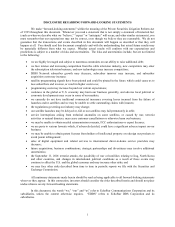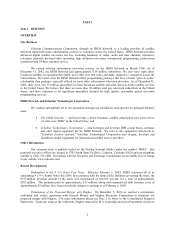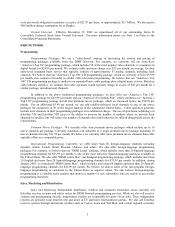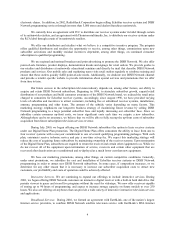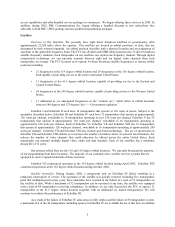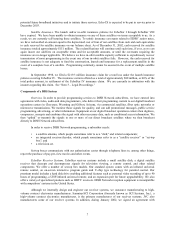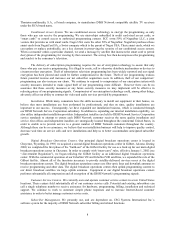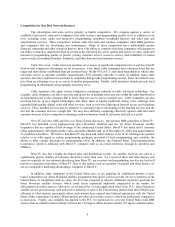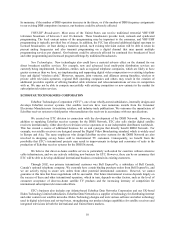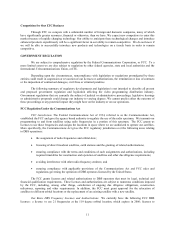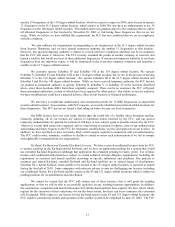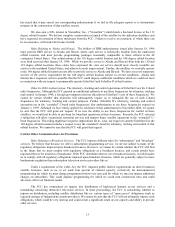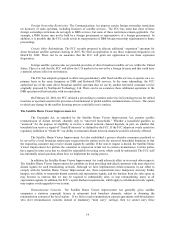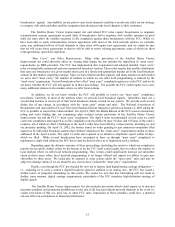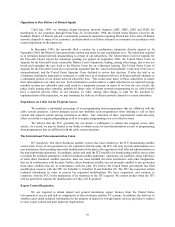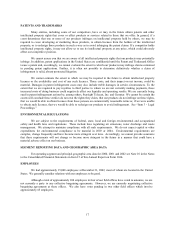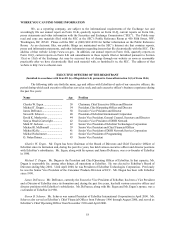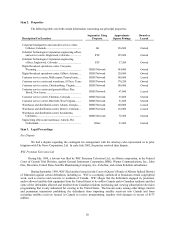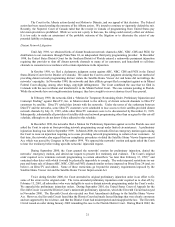Dish Network 2002 Annual Report Download - page 13
Download and view the complete annual report
Please find page 13 of the 2002 Dish Network annual report below. You can navigate through the pages in the report by either clicking on the pages listed below, or by using the keyword search tool below to find specific information within the annual report.11
Competition for Our ETC Business
Through ETC we compete with a substantial number of foreign and domestic companies, many of which
have significantly greater resources, financial or otherwise, than we have. We expect new competitors to enter this
market because of rapidly changing technology. Our ability to anticipate these technological changes and introduce
enhanced products expeditiously will be a significant factor in our ability to remain competitive. We do not know if
we will be able to successfully introduce new products and technologies on a timely basis in order to remain
competitive.
GOVERNMENT REGULATION
We are subject to comprehensive regulation by the Federal Communications Corporation, or FCC. To a
more limited extent we are also subject to regulation by other federal agencies, state and local authorities and the
International Telecommunications Union, or ITU.
Depending upon the circumstances, noncompliance with legislation or regulations promulgated by these
entities could result in suspension or revocation of our licenses or authorizations, the termination or loss of contracts
or the imposition of contractual damages, civil fines or criminal penalties.
The following summary of regulatory developments and legislation is not intended to describe all present
and proposed government regulation and legislation affecting the video programming distribution industry.
Government regulations that are currently the subject of judicial or administrative proceedings, legislative hearings
or administrative proposals could change our industry to varying degrees. We cannot predict either the outcome of
these proceedings or any potential impact they might have on the industry or on our operations.
FCC Regulation Under the Communications Act
FCC Jurisdiction. The Federal Communications Act of 1934, referred to as the Communications Act,
established the FCC and gave the agency broad authority to regulate the use of the radio spectrum. We transmit our
programming to and from satellites using radio frequencies in a portion of this spectrum. The FCC grants us
licenses to use those frequencies and assigns the locations in space where we are authorized to operate our satellites.
More specifically, the Communications Act gives the FCC regulatory jurisdiction over the following areas relating
to DBS operations:
• the assignment of radio frequencies and orbital slots;
• licensing of direct broadcast satellites, earth stations and the granting of related authorizations;
• ensuring compliance with the terms and conditions of such assignments and authorizations, including
required timetables for construction and operation of satellites and other due diligence requirements;
• avoiding interference with other radio frequency emitters; and
• ensuring compliance with applicable provisions of the Communications Act and FCC rules and
regulations governing the operation of DBS operators licensed by the United States.
The FCC grants licenses and related authorizations to DBS operators that meet its legal, technical and
financial qualification requirements. These licenses and authorizations are subject to numerous conditions imposed
by the FCC, including, among other things, satisfaction of ongoing due diligence obligations, construction
milestones, reporting and other requirements. In addition, the FCC must grant approval for the relocation of
satellites to different orbital locations or the replacement of an existing satellite with a new satellite.
Our Basic DBS Frequency Licenses and Authorizations. We currently have the following FCC DBS
licenses: a license to use 21 frequencies at the 119 degree orbital location, which expires in 2006; licenses to


